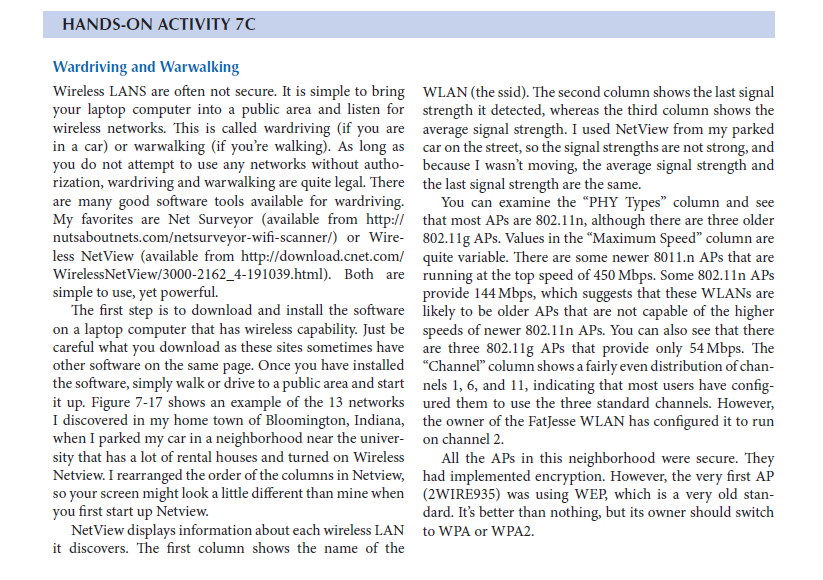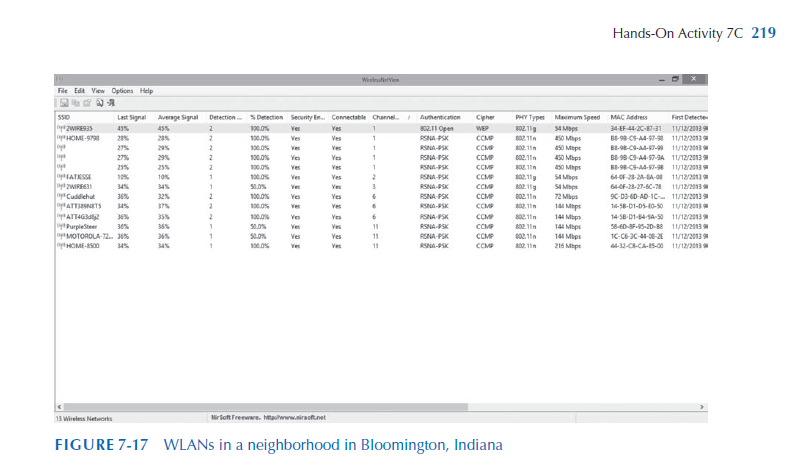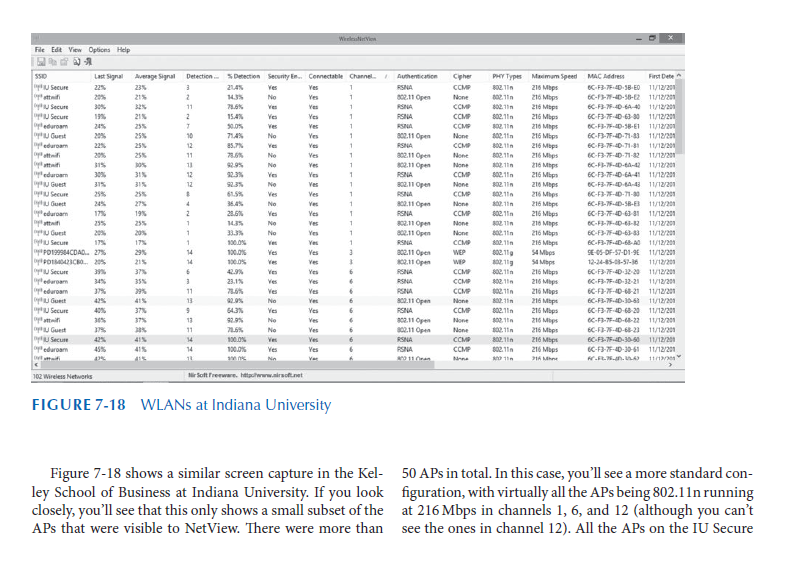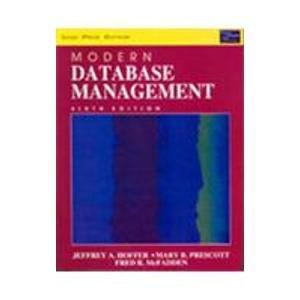I need help on 7C deliverables. The questions are on the final pictures.
Thanks!




HANDS-ON ACTIVITY 7C Wardriving and Warwalkin Wireless LANS are often not secure. It is simple to bring your laptop computer into a public area and listen for wireless networks. This is called wardriving (if you are in a car) or warwalking (if you're walking). As long as you do not attempt to use any networks without autho- rization, wardriving and warwalking are quite legal. There are many good software tools available for wardriving My favorites are Net Surveyor (available from http:// nutsaboutnets.cometsurveyor-wifi-scanner) or wire- less NetView (available from http://download.cnet.com/ WirelessNetView/3000-2162_4-191039.html). Both are simple to use, yet powerf WLAN (the ssid). The second column shows the last signal strength it detected, whereas the third column shows the average signal strength. I used NetView from my parked car on the street, so the signal strengths are not strong, and because I wasn't moving, the average signal strength and the last signal strength are the same. You can examine the PHY Types" column and see that most APs are 802.11n, although there are three older 802.11g APs. Values in the Maximum Speed" column are quite variable. There are some newer 8011.n APs that are running at the top speed of 450 Mbps. Some 802.11n APs provide 144 Mbps, which suggests that these WLANs are ul. The first step is to download and install the software likely to be older APs that are not capable of the higher on a laptop computer that has wireless capability. Just be speeds of newer 802.11n APs. You can also see that there careful what you download as these sites sometimes have are three 802.11g APs that provide only 54 Mbps. The other software on the same page. Once you have installed "Channe?" column shows a fairly even distribution of chan the software, simply walk or drive to a public area and start nels 1, 6, and 11, indicating that most users have config it up. Figure 7-17 shows an example of the 13 networks ured them to use the three standard channels. However, I discovered in my home town of Bloomington, Indiana, the owner of the Fatjesse WLAN has configured it to run when I parked my car in a neighborhood near the univer on channel 2. sity that has a lot of rental houses and turned on WirelessAll the APs in this neighborhood were secure. They Netview. I rearranged the order of the columns in Netview, had implemented encryption. However, the very first AP so your screen might look a little different than mine when (2WIRE935) was using WEP, which is a very old stan you first start up Netview. dard. It's better than nothing, but its owner should switch NetView displays information about each wireless LAN to WPA or WPA2. it discovers. The first column shows the name of the HANDS-ON ACTIVITY 7C Wardriving and Warwalkin Wireless LANS are often not secure. It is simple to bring your laptop computer into a public area and listen for wireless networks. This is called wardriving (if you are in a car) or warwalking (if you're walking). As long as you do not attempt to use any networks without autho- rization, wardriving and warwalking are quite legal. There are many good software tools available for wardriving My favorites are Net Surveyor (available from http:// nutsaboutnets.cometsurveyor-wifi-scanner) or wire- less NetView (available from http://download.cnet.com/ WirelessNetView/3000-2162_4-191039.html). Both are simple to use, yet powerf WLAN (the ssid). The second column shows the last signal strength it detected, whereas the third column shows the average signal strength. I used NetView from my parked car on the street, so the signal strengths are not strong, and because I wasn't moving, the average signal strength and the last signal strength are the same. You can examine the PHY Types" column and see that most APs are 802.11n, although there are three older 802.11g APs. Values in the Maximum Speed" column are quite variable. There are some newer 8011.n APs that are running at the top speed of 450 Mbps. Some 802.11n APs provide 144 Mbps, which suggests that these WLANs are ul. The first step is to download and install the software likely to be older APs that are not capable of the higher on a laptop computer that has wireless capability. Just be speeds of newer 802.11n APs. You can also see that there careful what you download as these sites sometimes have are three 802.11g APs that provide only 54 Mbps. The other software on the same page. Once you have installed "Channe?" column shows a fairly even distribution of chan the software, simply walk or drive to a public area and start nels 1, 6, and 11, indicating that most users have config it up. Figure 7-17 shows an example of the 13 networks ured them to use the three standard channels. However, I discovered in my home town of Bloomington, Indiana, the owner of the Fatjesse WLAN has configured it to run when I parked my car in a neighborhood near the univer on channel 2. sity that has a lot of rental houses and turned on WirelessAll the APs in this neighborhood were secure. They Netview. I rearranged the order of the columns in Netview, had implemented encryption. However, the very first AP so your screen might look a little different than mine when (2WIRE935) was using WEP, which is a very old stan you first start up Netview. dard. It's better than nothing, but its owner should switch NetView displays information about each wireless LAN to WPA or WPA2. it discovers. The first column shows the name of the










